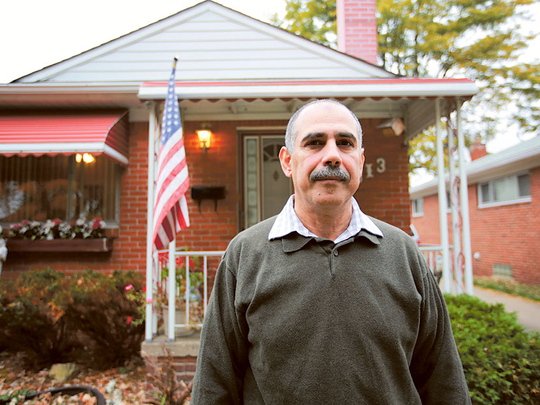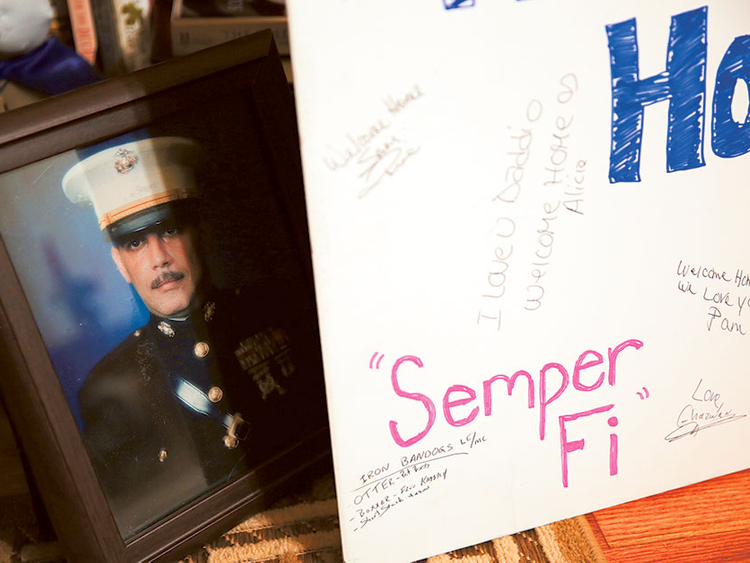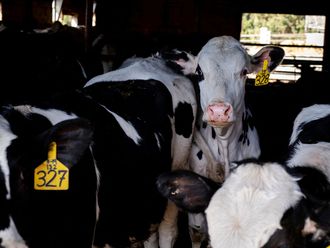
Dearborn Heights, Michigan: When Haisam Farran flew into Sana’a, the capital of Yemen, on March 19, he quickly spotted the discreet surveillance. The city was in the hands of Al Houthi rebels, but the National Security Bureau was little changed, and Farran, a retired Marine and former assistant defense attache at the US Embassy, was well known to local security officials. He said he regarded the watching eyes as routine, not threatening.
Farran’s company provided security services, including guards, to Western companies in Yemen. And he was one of very few Americans still willing to travel to the country after the Al Houthis toppled a US-backed government.
Six days after Farran arrived, Saudi Arabia launched an air campaign in an effort to dislodge the rebels that the Saudis say is backed by Iran. Farran, 54, was in a house owned by the British American Tobacco company, one of his clients, when the bombs began to fall.
He was joined there by another American, Scott Darden, who worked for New Orleans-based Transoceanic Development, overseeing the transport of humanitarian supplies in Yemen.
The Saudi campaign, supported by the United States with intelligence and other assets, suddenly made any American in Sana’a deeply suspect. And Farran was about to begin a 177-day ordeal of sometimes savage beatings in a prison where his cellmates were Al Qaida operatives.
“We used to call it one death for each day. You know how you get up and start a new day? Over there you wake up and wish you were dead again,” said Farran, a Lebanese American dual national, in his first extensive interview since his release.
Speaking at a Middle Eastern restaurant and hookah lounge just outside Detroit in Dearborn Heights, where Farran lives, he provided a rare glimpse into the rule of the Al Houthis - the rebels who continue to control the levers of power in Yemen and have withstood six months of Saudi bombing.
On the night of March 27, nearly a dozen men - armed with American-made M-4 assault rifles and wearing crisp camouflage uniforms - stormed the villa. Farran recognised them as members of a counterterrorism unit, funded and equipped by the United States, that was built to fight Al Qaida.
Now they were commanded by three Al Houthis who wore keffiyeh scarves, Farran said.
We used to call it one death for each day. You know how you
get up and start a new day? Over there, you wake up and wish you were dead again.
The men confiscated the Americans’ cellphones and computers and ransacked the villa as Farran and Darden sat at a table. They took more than $5,000 in cash that Farran had in his wallet. When the search was complete, the Americans were stripped to their underwear and T-shirts, blindfolded and shoved into separate, armored Toyota Land Cruisers.
Darden declined to discuss his detention. Through a spokesman, he said, “I want to thank everyone who has supported me and my family the last six-plus months.”
As he was being driven away, Farran wanted know where he was being taken. “Don’t ask,” one of the Al Houthis said.
Farran began to worry he would be summarily executed. “The thought did cross my mind,” he recalled.
About 30 minutes later, Farran, still blindfolded, was hustled into an interrogation room. His computer was on the table. The interrogator wanted to know the password to his e-mail account and his presence on social media, including Facebook.
“Why are you in Yemen?” the interrogator asked.
Farran explained his business in the country.
You are a spy
“You are a spy,” the interrogator said.
Why had he arrived just before the bombing? Was he providing targeting information to the Americans, the interrogator asked, so the Saudis would know what to hit?
Farran denied it.
“Liar,” the interrogator said. And then someone started to slap him repeatedly and box his ears. Farran, still blindfolded, thought his head was going to explode. Eventually, he lost consciousness.
Farran was dragged to a cell where he was given sweat pants and a shirt but no shoes. There was a tap and a bucket to wash, a commode and a thin mattress. There were three meals a day, mostly stews and chilies, but Farran would lose more than 30 pounds while incarcerated.
He had three cellmates, two of them medics in Al Qaida’s local affiliate, who told him he was in a prison on a military base they called “Guantanamo Yemen.”
Back to interrogation
Three days later, Farran was blindfolded and taken back to the interrogation room, where he was told to sit on the floor. The same cycle of accusation and denial continued until Farran said he was told to stand. He was struck repeatedly with a heavy stick on the arms and legs. He was black and blue when he was returned to his cell.
Another beating followed a few weeks later before Farran’s cellmates told him to feign heart trouble. It wasn’t difficult. Farran, who had undergone triple bypass surgery, had been taking heart medication when he was detained.
Days later, Farran faked a heart attack. He lay down on the floor and started breathing heavily and his cellmates banged on the door. The Yemenis took the “old man,” as they called him, to the hospital.
Farran said he was taken in a van with Casey Coombs, an American journalist who was detained in May and was injured. “He was in bad shape,” Farran said.
Coombs, who declined to be interviewed, was freed in June and flown to Oman.
At the hospital, Farran was given an electrocardiogram and prescribed his previous heart medication before he was returned to the prison.
Farran was moved to a different cell with a new group Al Qaida prisoners. He described them as hard-core, and he worried that they might harm him.
Farran, who speaks fluent Arabic, emphasised his Lebanese heritage, but that wasn’t much better than saying he was American, because he is a Shiite; Al Qaida is a Sunni group, and hostilities between the two branches of Islam run deep.
But the Al Qaida prisoners were also curious about Farran. He told them about the Yemeni community in Dearborn. His cellmates thought all Muslims were mistreated in United States and could not pray freely there. Farran gently correctly them.
His cellmates never threatened him. In fact, at one point they said there was a rumour that Al Qaida was planning to break them out and asked him if he would come. Farran seriously considered it, as his interrogators had threatened to “disappear” him.
“What choice did I have?” he said. “I would take my chances with them.”
Pacing his cell for hours
When not chatting with members of Al Qaida, Farran would pace in his cell for hours until his knees and back hurt. Finally, after 130 days of detention, he was allowed to go outside for one hour.
The guards took him to a small prison yard, where he saw sunlight and Darden for the first time since they were brought to the military base. They hugged and cried. Darden confided that he, too, had been beaten. Before going back to their cells, Darden, a Muslim convert, kissed Farran on his forehead as a sign of respect and devotion.
Although the physical abuse ended, the interrogations continued, and the Al Houthis wanted Farran to sign a confession that he was spy.
“Nobody is asking about you,” one interrogator said. “You’re on your own. You can make this easy or hard. Sign the confession and you can walk out of here.”
In fact, a new Hostage Recovery Fusion Cell led by the FBI had been trying to secure his freedom, as had Ali Soufan, a former FBI agent with deep ties in Yemen, who had previously employed Farran in his international security firm, the Soufan Group.
There were about dozen interrogation sessions in all, Farran said, but by the end the Al Houthis had stopped accusing him of being a spy.
“Finally they gave up,” he said. The last two times the Al Houthis questioned him, he said, they chewed qat together.
The Al Houthis have not said anything about the detention of the Americans, but Farran believes that diplomatic pressure, along with their conclusion that he was not a spy, led to his release.
About a week after the final interrogation, the guards asked his shoe size, a clear sign to Farran that he was going home.
“I fell on the ground, “ Farran said. “I was shocked. It’s hard to believe. Everyday you pray for that moment.”
Even his Al Qaida cellmates were happy for him. They were praising Allah, Farran said.
Wearing new shoes and clothes, Farran and Darden were driven to the airport on September 20.
Farran wondered: “Is this happening? Am I really going home?”
The two Americans boarded an Omani Air Force Boeing 737 first and were followed by a British-Somali citizen as well as four Saudis.
Scores of wounded Al Houthi fighters were also brought aboard, along with a delegation headed to talks in Oman.
And then they waited. And waited. For hours. A third American - a Muslim convert who had been teaching English in Sana’a - was also supposed to be on the plane.
US officials implored the Omanis not to leave without the other American. But the Omanis said it was too dangerous to remain, and eventually the plane took off.
The third American is still in custody in Sana’a.













